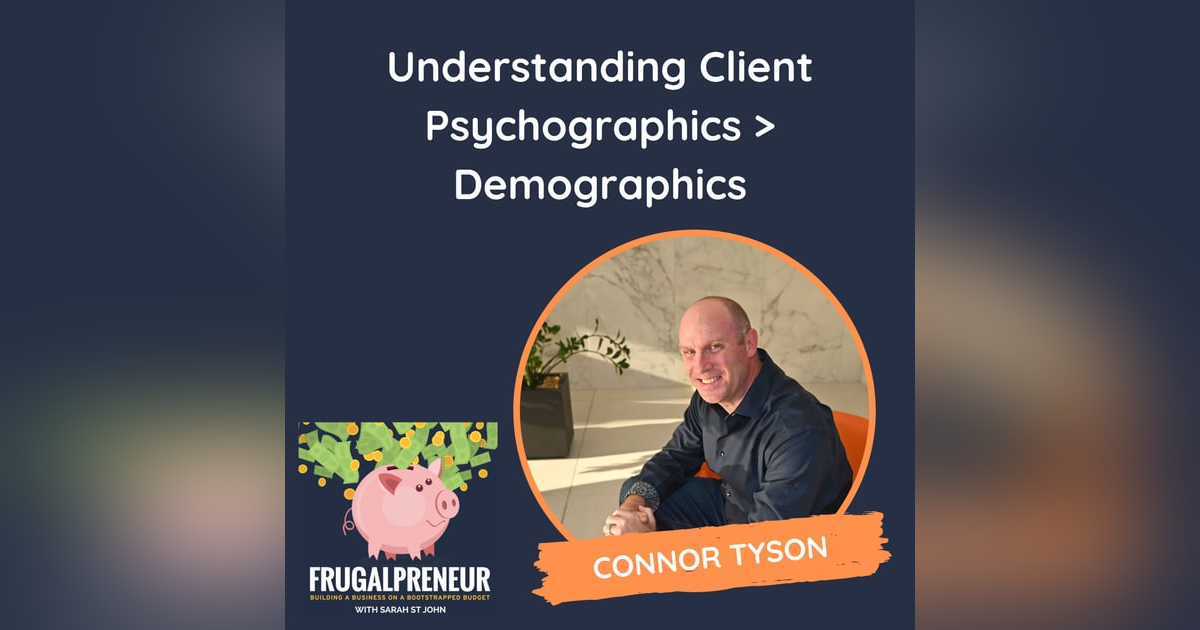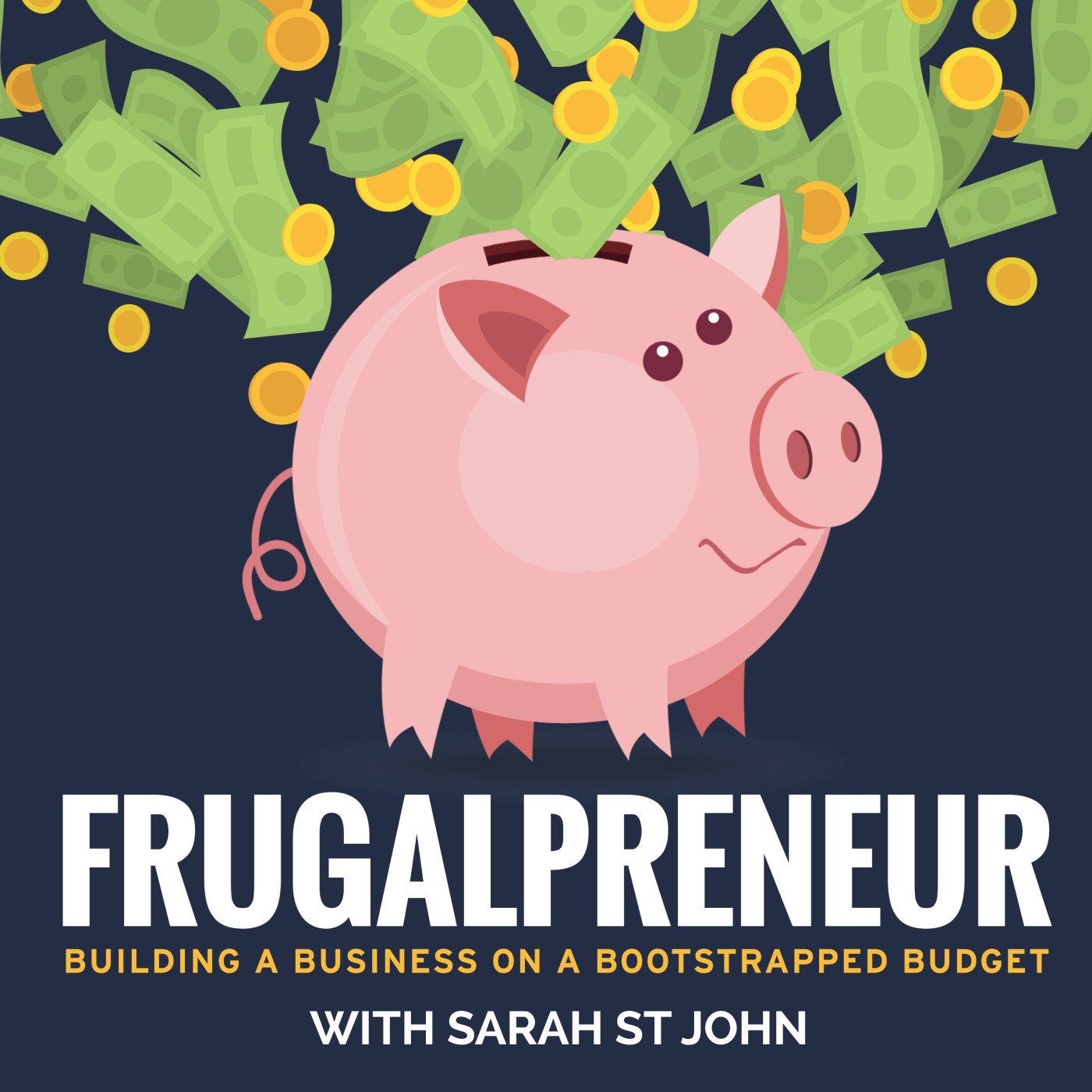Understanding Client Psychographics > Demographics (with Connor Tyson)

This episode serves as a profound exploration of the journey of a bootstrapped entrepreneur, Connor Tyson, who elucidates pivotal strategies that have facilitated his ascent in the realm of personal financial coaching. At the crux of his narrative lies the assertion that the cultivation of genuine client relationships is paramount, as it fosters trust and enhances referrals, thus propelling business growth. Connor emphasizes the significance of understanding client psychographics, advocating for a deep comprehension of their challenges and desires, which in turn informs effective marketing strategies. He candidly recounts his missteps with paid advertising, illustrating the necessity of aligning marketing efforts with one's niche and audience preferences. Ultimately, this episode aims to impart actionable insights that aspiring entrepreneurs can readily implement in their own ventures, reinforcing the notion that one is not alone in the struggles of bootstrapping a business.
The podcast delves into the intricate and often challenging world of entrepreneurship through the lens of Connor Tyson, a personal financial wellness coach who has successfully navigated the complexities of launching his own business. Connor shares his motivation for transitioning from a traditional finance career to a coaching role, driven by a desire to equip individuals with the knowledge and skills necessary to manage their financial lives effectively. His insights illuminate the critical role that habits and behaviors play in financial success, advocating for a shift in focus from products and services to the underlying mindset that governs financial decision-making.
Throughout the discussion, Connor emphasizes the need for entrepreneurs to adopt a lean approach when starting their ventures. He recounts his early experiences of utilizing personal savings judiciously and minimizing operational costs to maximize revenue potential. By leveraging existing networks and prioritizing client relationships, Connor has crafted a business model that thrives on referrals and personal connections. His success is attributed not only to his industry expertise but also to his commitment to providing value and fostering trust with his clients, which has proven instrumental in generating sustained business growth.
Connor does not shy away from discussing the challenges he faced, particularly regarding the efficacy of paid advertising campaigns that did not yield the desired results. His candid reflections on the lessons learned from these experiences serve as a valuable reminder to entrepreneurs about the importance of strategic marketing and the need to remain focused on what resonates with their audience. By encouraging a deeper understanding of clients' needs and desires, Connor advocates for a more personalized approach to business that prioritizes authentic connections over impersonal marketing tactics. This episode serves as a rich resource for aspiring entrepreneurs seeking to bootstrap their businesses while navigating the intricacies of financial management and client engagement.
Takeaways:
- The podcast emphasizes the importance of understanding client psychology rather than merely focusing on demographics.
- Building genuine relationships with clients can substantially enhance business growth through referrals and trust.
- A significant lesson learned is the ineffectiveness of paid advertising for certain niches, emphasizing personal connections instead.
- Entrepreneurs are encouraged to minimize overhead costs while focusing on maximizing revenue for sustainable growth.
- The speaker advocates for a proactive rather than reactive approach to financial management in business operations.
- Listeners are reminded that they are not alone in their struggles as solopreneurs and should seek help when needed.
Relevant Links:
00:00 - Untitled
00:44 - Untitled
01:07 - Introduction to Showcase Episodes
02:36 - Starting a Personal Financial Wellness Business
03:58 - Building Genuine Client Relationships
05:22 - Understanding Client Needs for Business Success
06:06 - Understanding Client Needs in Financial Coaching
07:57 - Business Growth and Support
Welcome to the Frugalpreneur podcast. I am your host, Sarah St. John.This episode is what I refer to as a showcase episode where I feature a bootstrapped entrepreneur and they briefly share their tips, tricks, tactics, techniques and tools that help them bootstrap their business and the successes and failures along the way.My hope is that each of these showcase episodes will provide at least one valuable takeaway that you can implement with right away in your own bootstrap business journey. Now onto the episode.
Connor TysonAll right, so a little background history as to who I am. So my name's Connor Tyson, Married, two kids, lifelong resident of New York. I graduated Quinnipiac University with a degree in finance.I hold a Series 65 investment advisor license, New York life insurance license, and also obtained the chartered Financial Consultant designation. What does all that mean? Is that I, I have a lot of different areas of which I can help people with, with their finances.But when I was in the industry itself, I realized that it's really about habits and behaviors, not what, right. The what was the products and services. And they don't teach you stuff in schools.And a lot of people are trying to build a car, driving down the highway, trying to figure this stuff as they go along, and it's not working out too well. You see it with student loan debt and credit, credit cards and divorce. Number one reason for divorce, money issues.And I just was like, you know what? I took it upon myself. I put the flag in the ground.I wanted to become a personal financial wellness coach and just help people with gaining clarity, confidence and control of their personal finances and help them with the habits and behaviors and the things I wasn't compensated for as a financial advisor, which was budgeting and debt elimination and communication about money and how to teach your kids about money. So that's what really led me to start my business, was to meet people where they're at and help them obtain what is they truly want in life.And it's been working out quite well. And I love what I do. You know, when starting my business, I started small, right?So I used a little bit of my personal savings to kick the business off. I focused on being a lean, mean, fighting machine, right? So you want to minimize the overhead and try to expand as much revenue as you can.So I leveraged my industry experience of the network I built out with working colleagues and I really got into networking and getting the message out of where it is I do, who I serve, how I serve them, and having people feel comfortable with referring people to me. I did marketing On a budget. I did word of mouth.I used social media, I did referral campaigns for people, and I wanted to gain visibility as much as I could. Another thing is obviously podcasts. You want to be the loudspeaker before the magnet. I kept costs low.I used tools that were very inexpensive, if not free. My website, I did it myself. I used canva. I used AI where I could to make it more efficient. I really focused on the client experience because that's.And what it is I do, the client comes first. And if you take care of them, the rest will take care of itself.My biggest success with my business would probably be building genuine client relationships, right?Where really getting to know and creating deep, trusting relationships with your clients, where it's easy for them to introduce you to people and make referrals and not hesitating to do so. And they almost become raving fans of what it is that you do, because they feel that transformation in their lives.And I've been able to grow my business steadily through introductions, referrals, word of mouth, because they can speak to what it is I do. What I did for them. My biggest failure would probably be paid advertising.I put a lot of money into Facebook ads and invested time and money into campaigns that didn't yield much results. The ROI on that was not very fruitful. And I learned some tough lessons, like, you really need to know who you're working with.Like, the digital ads wasn't the right fit for my niche. Meaning, like, the audience prefers personal connection and credibility over generic ads.And I put a lot of time and energy into that, and it didn't yield what is I needed. So that was my biggest failure, trying to bootstrap my business, especially when I was struggling. I got the shiny object syndrome, right?Like, oh, it has to be this. And I tried a lot of different things instead of focusing on what worked.So if I could refine what was working versus trying to find other substitutes for that, I probably would have got further along.My biggest tip for people to help bootstrap their business would be understand your client psychographically, not the demographics of their age, where they live, their income. What is it they're saying themselves about the challenge, their face? Or what are they looking to solve for? What are they googling?What are they saying to their best friend? What is it they're really struggling with? What is it you solve for?And if you get that message down and you know what they're saying, you can disseminate that information to your network. And when they hear those Things they can introduce you.And introductions or referrals are the lowest cost form of marketing with the highest results, the biggest return on investment and the conversion is very high. My biggest tip to people is really understand what you do, what you solve for, how you do it and what is it the client is saying to themselves.Like my instance, people want to get out of debt or get budgeting, that's not what they want. What is it they're saying to themselves? What they want is the feeling of being debt free and what that would enable them to do.They don't want a budget, they want the feeling of control over their money and what that would enable them to do. Sleep better, stop the money fights. And what is it they say? Like I find myself winging it. That's their words, winging it. I'm winging it every month.So I tell people, listen. If you have ever hear somebody say I'm not a numbers person, I'm always winging it with my personal finances. That's an introduction to me.They listen for that and they introduce me to people like, oh, here, you gotta talk to Connor. If you're a small business owner and you're struggling, you're a solopreneur, you're not alone. And why they don't teach you stuff in schools, right?You're passionate about some idea product or service, then it's like, okay, great, go run a business. The fact that you're struggling and trying to stay bootstrapping your business is not your fault.I need some help in how to launch this business in a successful way.So I have resources on my website which is@progress fc.com or you want to make some progress fc is financial coaching.com so it's progress fc.com you visit there. There's tools and resources. I have business launch kit, any solopreneur three years and under. I help people with cash flow management to simplify it.It's not a complicated thing. The difference between you, me and an accountant is they read different books.So if you get that knowledge of how to be proactive versus reactive, you can really grow your business and you don't have to keep bootstrapping it every single month. That would be my last thought. You're not alone. Reach out for help. You're obviously listening to this for a reason and I commend you for that.And if you need help, reach out. And Everybody gets a 45 minute consultation to talk about their business, what they're struggling for and how we can solve that.
Sarah St JohnI hope you enjoyed that episode and were able to take away a valuable nugget of information that you can implement right away in your own business. If you feel your story would be valuable for the listeners of this show, please visit Frugal Show Guest.








